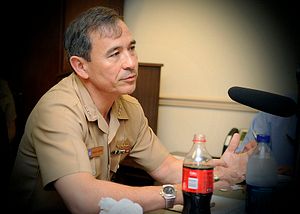The United States and India have started sharing information on Chinese submarines in the Indian Ocean region, Admiral Harry Harris, commander of U.S. Pacific Command, confirmed last week in New Delhi. Speaking to reporters at this year’s Raisina Dialogue, a security forum held in New Delhi, Harris said that “There is sharing of information regarding Chinese maritime movement in the Indian Ocean.”
Harris added that the United States works “closely with India and with improving India’s capability to do that kind of surveillance. Malabar exercise… helps us hone our ability to track what China is doing in the Indian Ocean. Chinese submarines are clearly an issue and we know they are operating through the region.”
According to the Indian Express, Harris cautioned that “India should be concerned about the increasing Chinese influence in the region.” Harris painted a zero-sum picture of influence in Indian Ocean: “If you believe that there is only finite influence, then whatever influence China has means that influence India does not have.”
Harris’ admission of information sharing between India and the United States is a first, but there were reports last year that the two countries were considering the move. Mutual concerns over Chinese activity in the Indian Ocean have played a part in accelerating strategic convergence between India and the United States. In 2015, the two countries renewed their defense cooperation framework for 10 years and last year, the United States declared India a “Major Defense Partner” — a bespoke status that will allow New Delhi access to U.S. technology at the level of the country’s closest allies.
Moreover, last year, the two countries finalized the first three so-called foundational agreements on defense, the Logistics Exchange Memorandum of Agreement. Two additional agreements — the Communications Compatibility And Security Agreement (COMCASA) and the Basic Exchange and Cooperation Agreement (BECA) are currently under negotiation; Harris told Ajai Shukla of the Business Standard that he expected that the agreements would come in due time, with COMCAS “likely to come first.”
In its report last year on the Chinese military, the U.S. Department of Defense confirmed publicly for the first time that Chinese Song- and Shang-class submarines were carrying out regular operations in the Indian Ocean. The report noted that “China’s current naval logistics footprint in the Indian Ocean is unable to support major combat operations in South Asia,” but Harris seemingly updated that view when he remarked last week to Shukla that “there is probably nothing that could prevent China from sailing an aircraft carrier into the Indian Ocean today.”
Harris’ acknowledgement of “information” sharing does not imply that the two countries are sharing detailed intelligence on the movements of Chinese submarines, necessarily. In fact, proponents of a speedy conclusion of COMCASA and BECA have long argued that these agreements would enable New Delhi to receive that sort of more detailed intelligence and improve interoperability between Indian and U.S. P-8 surveillance aircraft.

































